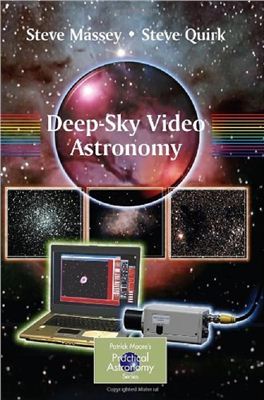Springer, 2009. - 185 pages. Patrick Moore's Practical Astronomy
Series
Deep-Sky Video Astronomy is a concise guide to using mode video cameras for deep-sky viewing and imaging with the kinds of modest telescopes available commercially to amateur astronomers. It is not a beginner's book, but it does include an introduction and brief history of the technology, camera types, etc. More importantly, the authors examine the pros and cons of this unrefrigerated yet highly efficient technology, which is already beginning to compete with expensive astronomical cooled-chip CCD cameras in quality and ease of use.
The book also includes a thorough examination of the variety of accessories that are available and can be used to achieve a particular result. Examples of accessories are focal reducers, Barlow lenses, and optical filters. However, much of the book's focus is on the practical side of creating beautiful and detailed astronomical portraits using image-stacking software, picture enhancement tools such as Photoshop, and in creating color images using only a very sensitive black-and-white camera.
Practical step-by-step examples, supported by tried and trusted tips, show how it is possible to achieve the best possible celestial deep-sky video portrait!
There is also information on how this technology is being used for comet hunting, supeova patrols, lunar and Minor Planet occultations, astrometry, and meteoroid observations.
Deep-Sky Video Astronomy is a concise guide to using mode video cameras for deep-sky viewing and imaging with the kinds of modest telescopes available commercially to amateur astronomers. It is not a beginner's book, but it does include an introduction and brief history of the technology, camera types, etc. More importantly, the authors examine the pros and cons of this unrefrigerated yet highly efficient technology, which is already beginning to compete with expensive astronomical cooled-chip CCD cameras in quality and ease of use.
The book also includes a thorough examination of the variety of accessories that are available and can be used to achieve a particular result. Examples of accessories are focal reducers, Barlow lenses, and optical filters. However, much of the book's focus is on the practical side of creating beautiful and detailed astronomical portraits using image-stacking software, picture enhancement tools such as Photoshop, and in creating color images using only a very sensitive black-and-white camera.
Practical step-by-step examples, supported by tried and trusted tips, show how it is possible to achieve the best possible celestial deep-sky video portrait!
There is also information on how this technology is being used for comet hunting, supeova patrols, lunar and Minor Planet occultations, astrometry, and meteoroid observations.

